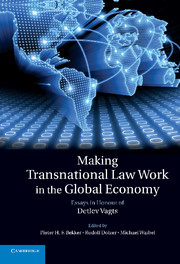Book contents
- Frontmatter
- Contents
- List of contributors
- Foreword: the transnationalism of Detlev Vagts
- List of cases cited
- List of abbreviations and acronyms
- Introduction: a Festschrift to celebrate Detlev Vagts' contributions to transnational law
- 1 Detlev Vagts and the Harvard Law School
- 2 Constructing and developing transnational law: the contribution of Detlev Vagts
- I International law in general
- 3 ‘Hegemonic international law’ in retrospect
- 4 Textual interpretation and (international) law reading: the myth of (in)determinacy and the genealogy of meaning
- 5 The changing role of the State in the globalising world economy
- 6 Sources of human rights obligations binding the UN Security Council
- 7 Is transnational law eclipsing international law?
- 8 Participation in the World Trade Organization and foreign direct investment: national or European Union competences
- 9 From dualism to pluralism: the relationship between international law, European law and domestic law
- 10 Transnational law comprises constitutional, administrative, criminal and quasi-private law
- 11 Founding myths, international law, and voting rights in the District of Columbia
- 12 The tormented relationship between international law and EU law
- 13 International law scholarship in times of dictatorship and democracy: exemplified by the life and work of Wilhelm Wengler
- II Transnational economic law
- III Transnational lawyering and dispute resolution
- Bibliography of Detlev Vagts
- Index
5 - The changing role of the State in the globalising world economy
from I - International law in general
Published online by Cambridge University Press: 17 November 2010
- Frontmatter
- Contents
- List of contributors
- Foreword: the transnationalism of Detlev Vagts
- List of cases cited
- List of abbreviations and acronyms
- Introduction: a Festschrift to celebrate Detlev Vagts' contributions to transnational law
- 1 Detlev Vagts and the Harvard Law School
- 2 Constructing and developing transnational law: the contribution of Detlev Vagts
- I International law in general
- 3 ‘Hegemonic international law’ in retrospect
- 4 Textual interpretation and (international) law reading: the myth of (in)determinacy and the genealogy of meaning
- 5 The changing role of the State in the globalising world economy
- 6 Sources of human rights obligations binding the UN Security Council
- 7 Is transnational law eclipsing international law?
- 8 Participation in the World Trade Organization and foreign direct investment: national or European Union competences
- 9 From dualism to pluralism: the relationship between international law, European law and domestic law
- 10 Transnational law comprises constitutional, administrative, criminal and quasi-private law
- 11 Founding myths, international law, and voting rights in the District of Columbia
- 12 The tormented relationship between international law and EU law
- 13 International law scholarship in times of dictatorship and democracy: exemplified by the life and work of Wilhelm Wengler
- II Transnational economic law
- III Transnational lawyering and dispute resolution
- Bibliography of Detlev Vagts
- Index
Summary
Introduction
In the present worldwide financial crisis with its various disastrous impacts on the world economy, we can observe a renewed interest in the role of the State as a regulating actor in the world economy. Put more precisely, the question is whether we are facing a movement toward a State-centred protectionism. There is already a handy catchword around for this alleged movement – i.e. ‘de-globalisation’. If this concept is to be understood as a plea for the reinstatement of the State as the main regulatory actor in the world economy which should and could play the dominant role in the struggle to overcome the consequences of the present worldwide financial crisis, the question must be answered whether today's States actually are still in a position to live up to this gigantic task on their own.
In other words, the question must be answered as to whether present-day States still fit the criteria of the traditional concept of the sovereign territorial nation-state as such criteria had been defined in international law and political theory in the early twentieth century. Only if this would be the case could we then consider ‘de-globalisation’ to be a possibly viable concept for solving the present economic and financial crisis, and potential future ones. The following considerations will proceed in three steps: a short look at the historic role of States in the regulation of their economies will be followed by an analysis of how the means and institutions of the State that fulfil public tasks have changed because of the impact of globalisation.
- Type
- Chapter
- Information
- Making Transnational Law Work in the Global EconomyEssays in Honour of Detlev Vagts, pp. 56 - 70Publisher: Cambridge University PressPrint publication year: 2010
- 1
- Cited by



